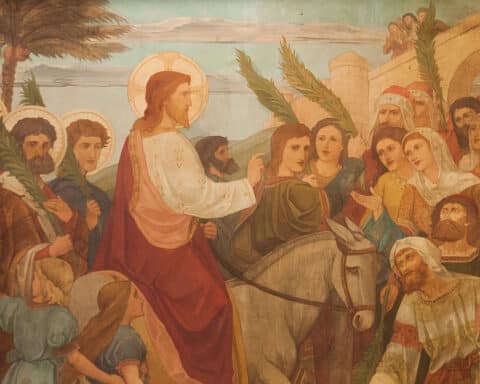
They cry out, as any of us might, asking how God could be so unfair. Were their sins deserving of a punishment so harsh? Will they continue to pay for the sins of their fathers forever?
| September 27 – 26th Sunday in Ordinary Time |
|---|
|
Ez 18:25-28
Ps 25:4-5, 8-9, 10, 14
Phil 2:1-11
Mt 21:28-32
|
The Lord speaks to them through Ezekiel the prophet. The Lord challenges the migrant citizens of Jerusalem to re-think what is fair or not. We often approach God demanding that God conform himself to our ideas of who God should be.
And yet, the prophet Ezekiel asks that we rethink this approach: Perhaps, we are the ones that are unfair or unjust. Stop thinking about one’s relationship in terms of reward and punishment. Instead, pursue holiness. Do what is just. When one converts, turning away from sin and death, one will live.
God will not punish the sinner because of the faults of his father or mother. God seeks the conversion of the individual sinner.
And yet, the presumption that God must conform himself to our thin view of “fair” or “unfair” did not disappear after the Babylonian exile.
Jesus is addressing the elders and the chief priests. He speaks using a parable of a man with two sons. One is told to go out to the vineyard to work, says no, and then goes anyway. The other is also ordered to the vineyard, says yes, and then does not go.
Who has performed God’s will, Jesus asks? It is obvious to us, right? The son who went to work in the field.
And yet, Jesus turns the parable back onto the chief priests and elders. John the Baptist announced a conversion of the heart. Jesus continues to announce the arrival of the kingdom of God, performing it in his very person. Tax collectors and prostitutes are listening, responding, giving everything up to follow Jesus. But not the chief priests. Not the elders.
Who does the will of God?
If you, dear friend, are reading a Scripture column in a Catholic newspaper on your own volition, you (and the author of the column) are more like the chief priests and the elders than the tax collectors and the sinners.
We are being challenged to pursue not “what’s fair,” a holiness that is “just enough” but total conversion to the living God. This means that any false presumption that we have arrived, that we have ascended to the height of holiness through our virtuous deeds is a sign that we are still wounded.
We must have the attitude of the tax collector or the prostitute, aware that redemption is a total gift. God is not playing a tit-for-tat game. You do good, then you get some good things. Rather, God wants the sacrifice of the whole heart joyfully lifted up to him.
We do not go this road alone. St. Paul hands onto us a hymn that the Church sings in the Liturgy of the Hours every Saturday night. Jesus is the God-man, who does not claim equality with God. He is not operating out of fairness but total, self-giving love. It is this love that is divine.
It is the self-emptying love of Jesus Christ that can save us from our far too thin notion of fairness. Is it fair that the Word became flesh and dwelt among us? Is it fair that the one born without sin carried the sins of the world on his back?
It’s not fair.
But it is love.
And that’s the currency of the kingdom of God.
Timothy P. O’Malley, Ph.D., is the director of education at the McGrath Institute for Church Life at the University of Notre Dame.





